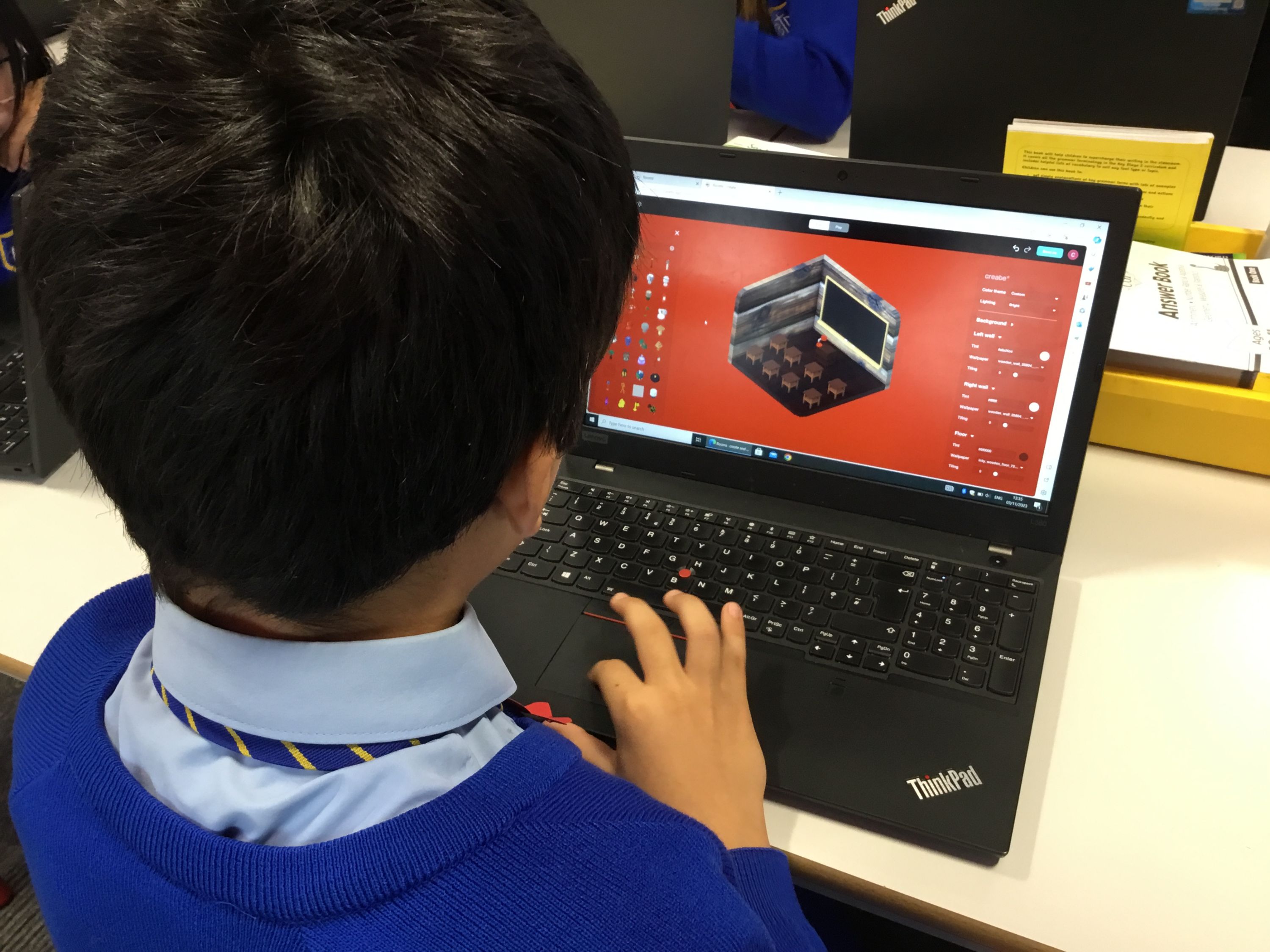Computing
Computing Vision
All pupils at Blessed Dominic Catholic Primary School have the right to have rich, deep learning experiences, incorporating a variety of cultural capital experiences, which balance all the aspects of computing. With technology playing such a significant role in society today, we believe ‘Computational thinking’ is a skill children must be taught if they are to be able to participate effectively and safely in this digital world, as well as celebrate their unique digital talents. A high-quality computing education equips pupils to think creativity and to understand and change the world.
Computing has deep links with mathematics, science, and design and technology, and provides insights into both natural and artificial systems. These connections are made through ‘aha moments’ within our broad and balanced curriculum. At Blessed Dominic, the core of computing is Computer Science in which pupils are introduced to a wide range of technology, including laptops, iPads, VLR headsets and interactive whiteboards, allowing them to continually practice and improve the skills they learn. This ensures they become digitally literate so that they are able to express themselves and develop their ideas through information and computer technology– at a level suitable for the future workplace and as active participants in a digital world. We aim to nourish and embrace children’s ambitions to be inspiring people of the future, through a rich variety of technological experiences demonstrating their joy and wonder within digital means.
We intend to build a computing curriculum that develops, pupil’s learning and results in the acquisition of knowledge of the world around them, which ensures all pupils can understand and apply the fundamental principles and concepts of computer science, including abstraction, logic, algorithms and data representation, can analyse problems in computational terms, and have repeated practical experience of writing computer programs in order to solve such problems. Computing ensures children are challenged and provided with modern day contextual outcomes that encourage them to be more resilient and independent for their future. Every child is supported through their understanding, whereby adaptations and extensions are provided to scaffold or extend learners digital knowledge.
Our vision is to build a computing curriculum that prepares pupils to live safely in an increasingly digital British society where pupils can evaluate and apply information technology, including new or unfamiliar technologies, analytically to solve problems. Here at Blessed Dominic, we encourage the route of oracy, and are making connections in order for the children to explain their digital substantive and disciplinary skills. Thus taking these outcomes into society and becoming digital ambassadors for future generations.
We teach a curriculum that enables children to become effective users of technology who can:
- Understand and apply the essential principles and concepts of Computer Science, including logic, algorithms and data representation;
- Analyse problems in computational term, and have repeated practical experience of writing computer programs in order to solve such problems;
- Evaluate and apply information technology analytically to solve problems;
- Communicate ideas well by utilising appliances and devices throughout all areas of the curriculum.
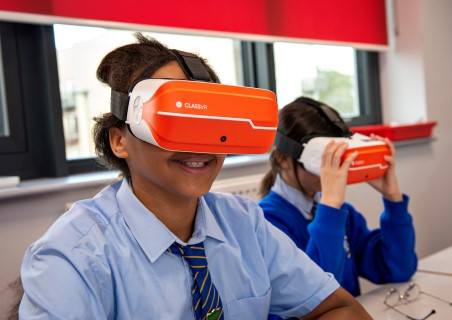
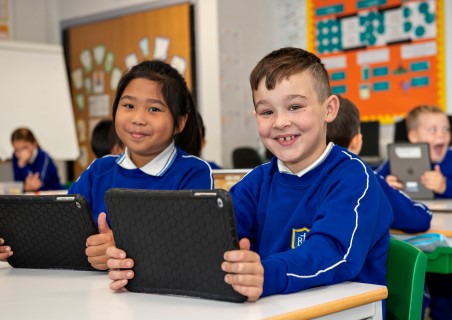
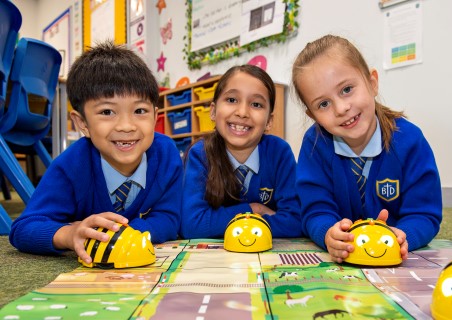
Characteristics of a Digital Citizen
At Blessed Dominic Catholic Primary School, we are Digital Citizens. We have…
- competence in coding for a variety of practical and inventive purposes, including the application of ideas within other subjects.
- the ability to connect with others safely and respectfully, understanding the need to act within the law and with moral and ethical integrity.
- an understanding of the connected nature of devices.
- the ability to communicate ideas well by using applications and devices throughout the curriculum.
- the ability to collect, organise and manipulate data effectively.
Our Computing Curriculum is underpinned by all children expecting to succeed and make progress from their starting points, following quality feedback and formative assessment. Verbal and written feedback will ensure all children review, consolidate and extend their existing understanding. Substantive and disciplinary skills are planned through lessons that ensure there is progression of these skills and pupils are challenged and/or supported where necessary. Cross-curricular computing lessons are encouraged to ensure all aspects of computing have a contextual basis and children can see their progression in real world scenarios.
Pupils become familiar with key vocabulary and terminology specific to the topic and we encourage teachers to ensure ambitious vocabulary is shared and applied in lessons. Computing terminology it presented at the start of the topic, and reviewed throughout the topic through prior learning points, such as flashback four. Children have opportunities to clarify, edit and refine structures to ensure their understanding is secure.
The cross-curricular approach to our computing enable pupils to think critically, embrace challenging activities and reflect will encourage broader thinking and encourage self-learning and curiosity. Children are encourage to explore new resources and software package to link their existing understanding to. The computing world is constantly developing advances and it is important the children have access to these new changes, through updated software and new hardware devices. Teachers will have sound knowledge of the curriculum area in order to deliver high-quality lessons and provide pupils with outstanding teaching and learning. Teacher will engage in frequent CPD to ensure their have an update understanding of the computing advancements.
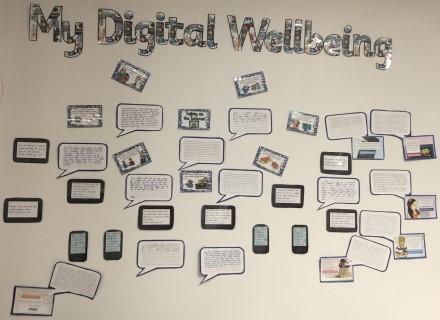
What does Computing look like at Blessed Dominic?
We have a team of highly skilled and knowledgeable computing teachers who deliver engaging lessons tailored to the needs of our pupils. Our teachers use a variety of teaching strategies and resources to facilitate active learning, enabling pupils to apply their knowledge, engage in collaborative problem-solving, and develop critical thinking skills.
EYFS
Pupils in the foundation stage are exposed to early experiences with digital resources, exploring them throughout lessons and in child-initiated play. Key focusses are on their application of simple programming terms, understanding the simple aspects of computer hardware and making links to their everyday experiences. They will learn how to program given devices, such as beebots, and begin to create their own programming instructions, introducing them to objectives for Key Stage 1.
KS1
Pupils should be taught to understand what an algorithm is and how it is used as programs on digital devices. They will need to understand that programs execute by following precise and unambiguous instructions.
Pupils will create and debug simple programmes, as well as using logical reasoning to predict the outcome (behaviour) or simple programs. They will use technology purposefully to create, organise, store, manipulate and retrieve digital content. Pupils will be given context for the use of technology beyond school and develop an understanding of how to use technology safely and respectfully, keeping personal information private. Finally, our pupils will understand where to go for help and support when they have concerns about content or contact on the internet or other online technologies.
KS2
Pupils should be taught to design, write and debug programs that have the aim of accomplishing specific goals. This includes controlling physical systems and solving problems by decomposing them into smaller parts. They will be using sequence, selection and repetition in programs to work with variables and various forms of input and output. Pupils use logical reasoning to explain how some simple algorithms work and to detect and correct errors in algorithms and programs. Pupils will be provided with the tools to understand computer networks, including the internet and how they can provide multiple services.
They will be using search engines effectively and appreciate how results are selected and ranked and understand how to evaluate digital content. Our pupils will select, use and combine a range of software on a variety of digital devices to create programs, systems and content that accomplish given goals. Finally, pupils will understand how to use technology safely, respectfully and responsibly. Recognising acceptable/ unacceptable behaviour and identify how to report concerns regarding content and contact.
Sequential and Progressive Curriculum
Our Computing curriculum is carefully designed to ensure both continuity and progression of learning throughout the primary phase. We have mapped out a coherent sequence of topics and skills, building upon prior knowledge and allowing pupils to develop a deep understanding of computing concepts. We integrate computational thinking across the curriculum to make cross-curricular links, enhancing pupils' understanding of how computing impacts various domains.
Focus on Computational Thinking
We prioritise the development of computational thinking skills, including algorithmic thinking, logical reasoning, and problem-solving. Our pupils learn to break down complex problems into manageable steps, identify patterns, and create algorithms to solve them. They develop their ability to debug, evaluate and improve their computational solutions, fostering resilience and determination.
Practical Application and Real-World Contexts
We provide ample opportunities for pupils to apply their computing knowledge and skills to real-world contexts. Through practical projects and authentic problem-solving tasks, our pupils develop a deep understanding of how technology is used in various sectors, such as science, engineering, and mathematics. They are encouraged to think critically about the ethical and social implications of technology and develop responsible digital citizenship.
Access to Technology and Resources
We ensure that all pupils have access to up-to-date technology and resources to support their learning in Computing. This includes laptops, tablets, and a range of software tools and programming languages. We also encourage pupils to use their own devices at home, through Google Classroom, fostering a blended approach to learning.
Enrichment Opportunities and Partnerships
We provide enriching opportunities for our pupils to expand their Computing knowledge and skills beyond the classroom. We organise, connect our computing experiences to our cultural capital experiences, invite guest speakers from the industry, and use various coding challenges and embrace digital opportunities. Pupils will have the opportunity to partake in a range of technology-driven extracurricular clubs, such as Technology Club, Minecraft, Robotics and Debuggers. As well as this, our debuggers contribute towards running school events and competitions for children to take part in or ‘try out’.
More able and challenge
All pupils, especially those with sound understanding, will be challenged and given the opportunity to deepen and broaden their learning. Teachers will give pupils the opportunity to apply their skills in lessons independently. Children to show understanding of their computing skills through supporting staff and peers in collaborative learning, to show their knowledge and consolidate what they have learnt.
Assessment
There are five units, each unit will end with the school's summative tracker. Each class has an evidence book for hard copies named ‘My Digital Journey’. QR codes and photos are also taken- showcasing skills in real time. To support this, classes complete a digital assessment task which informs teachers planning. For example, in Year 6 to evidence their computer science and coding the children were asked to create either a WW2 classroom or a room in the house demonstrating their experience to the RAF Wartime classroom.
Teachers assess outcomes with a final piece of computing linked to the skills demonstrated throughout the unit. Once complete, this will inform teachers’ judgments with regards to the children understanding and allow them to complete the unit tracker, found on the system. This is completed every half term. Notes on specific groups of children such as SEND and pupil premium are made on the tracker to highlight gaps in understanding and what areas intervention may be needed. Termly assessments are placed on our whole assessment tracker – Insight.
Impact
Our Computing Curriculum is high quality, well-thought-out and is planned to demonstrate progression. If children keep up with the curriculum, they are deemed to be making good or better progress. In addition, we measure the impact of our curriculum through the following methods.
Pupil Voice
Pupils will show through questionnaires, pupil conferencing and focus groups their understanding and enjoyment of the subject. Conversations with digital leaders about their understanding of the curriculum and how it is delivered and areas they would like to develop further. Through subject leader monitoring and frequent meetings with digital leaders, important messages from the pupils perspective are collated and distributed throughout the school community.
Evidence in books and online
Links across subjects will be shown in books and children evidence understanding of vocabulary and concepts by responding to a relevant question. Year group work can be found on the system, where each class has an evidence folder to store photo, videos, and screenshots and QR codes of children digital understanding. Pupils are encouraged to keep track of their documents and organise them correctly. During open evenings, children should be able to open up designs/ programs and discuss them with parents/ visitors in detail.
Teachers to use the Google drive to store digital work samples, through cross curricular lessons. This can be stored during remote learning as well. Teachers use QR codes, to display digital work on displays and as links in Google Drive. This then can be shared with whoever needs it, including parents through Google Classroom. End of unit examples are collected and placed in My Digital Journey scrapbook that moves up with the children, showcasing their computing journey from the foundation stage to Year 6.
Substantive and Disciplinary skills
Pupils will end units being able to apply and demonstrate they can effectively use computing skills. They will progress throughout the year groups building upon these skills and reflect the planned outcomes. Teachers are asked to complete a termly planning evaluation to help identify skills taught and gap in their learning, to inform future planning. This is save centrally in the shared drive for the SL and SLT to use to inform them of progress and curriculum mapping.
Outcomes
Outcomes of work will reflect those planned. The National Curriculum objectives will be met. Outcomes will reflect the age and ability of pupils. Pupils will have access to a broad range of activities and outcomes which will reflect the well planned and delivered curriculum. Pupils have real life digital experiences that are incorporated within a broad curriculum. Children to see how their digital literacy can develop to give them experiences of how it could be used in a modern context such as iMovie trailers are Padlet vlogs. Teachers assess outcomes with a final piece of computing linked to the skills demonstat4ed throughout the unit. Once complete, this will inform teachers’ judgments with regards to the children understanding and allow them to complete the unit tracker, found on the system. This is completed every half term. Termly assessments are placed on our whole assessment database – Insight.
